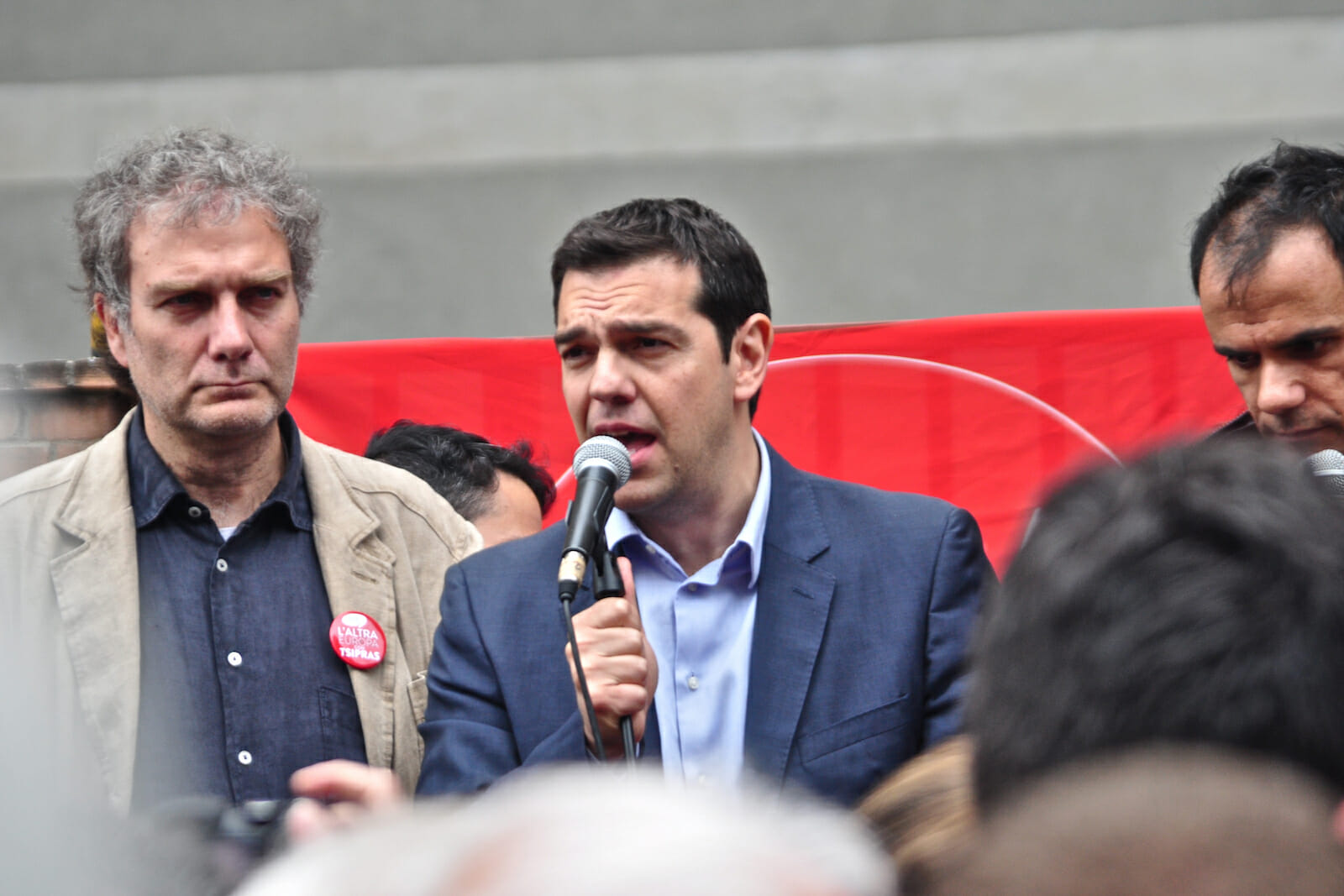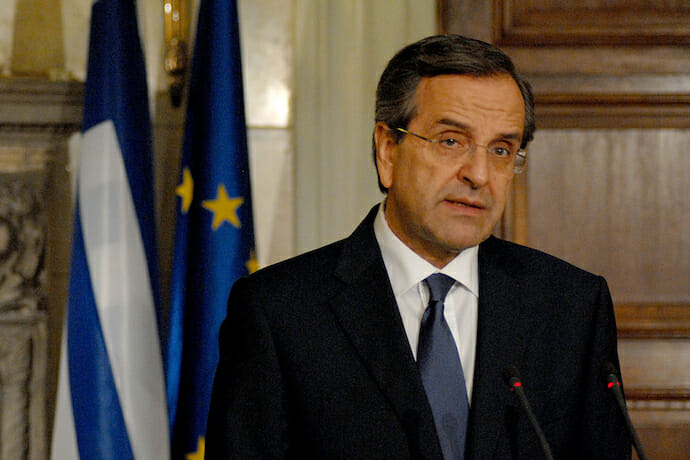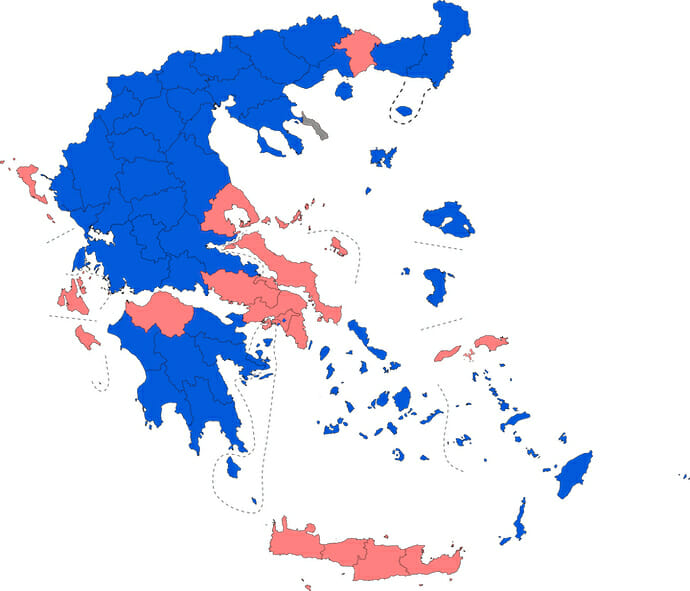
The Puzzle of the 2012 Greek Elections
With the Greek Parliamentary election behind us—likely the first of at least two such contests in this political season—we need to take stock of the situation and separate myth from fact. My objective is to make sense of the electoral results by describing and analyzing the Greek political system in both its historic and nascent forms. The particulars of the bailout have been widely discussed elsewhere in the press and policy circles, and I will refer to them only in the ways in which they inform the topic. One place to start is to ask whether there is anything positive about the electoral outcome. Paul Krugman made the reasonable argument in a recent article in The New York Times that the electoral results in France and Greece reflect what has been patently the case for the last 18 months: the IMF’s, the EU’s and, especially Germany’s, austerity-first strategy to fix the sovereign debt crisis in the region, has failed. Voters appear to realize it while governmental and international civil service elites appear not to.
The near-freeze of international capital markets and the disability of the Greek banking sector to navigate the crisis unaided by outside financing have stalled the economy and have resulted in unemployment rates near or at the 20% level (50% among those younger than 25). With poverty becoming a mass phenomenon, and prospects for recovery under the austerity plan thin at best, it is understandable that Greece’s political class was going to be made to pay.
The structure of the Modern Greek political system reflects ideological and social cleavages, partisan electoral strategies, and the force of entrenched elites and personalities. In short it is complex and quite peculiar. Normative categories such as ‘right,’ ‘left’ and ‘center,’ described Greek parties less and less after the contentious politics of the Cold war ended, and after memories of historic struggles between the left and the right started to fade from memory—I am referring to the Greek Civil War of 1946-49, and the Colonels’ Junta of 1967-74.
In the first few years after the return to democracy in 1974, the polemical Panhellenic Socialist Party (PASOK) founded by Andres Papandreou—the father of the latest elected Prime Minister of Greece—was nothing short of radical. The centerpiece of its domestic policy agenda was ‘Change,’ which was a short-hand for a rhetorical if not actual commitment to wealth redistribution. The centerpiece of its foreign policy was exit from NATO, and at times, also exit from the then European Economic Community—policy axes that should be considered vastly more radical and controversial than any anti-austerity position that mainstream parties hold today in Greece.
Using very effective communication strategies, Papandreou built PASOK into a formidable party that claimed to represent the Socialist alternative to the Conservatives’ New Democracy (ND) party.
In contrast to the countercultural PASOK, ND was a mainstream bourgeois party created in 1974 by Constantine Karamanlis out of the rubble of the military Junta. The elder Karamanlis was the uncle of the PM who Andreas Papandreou replaced in the election of 04 October 2009. By now it should be quite clear that Greek national politics has been a family affair. ND ruled with decreasing majorities through the mid- and later 1970s, until PASOK became primate in 1981.
Between them stood what was at the time a robust and pragmatic ‘center’ defined by a two-party alliance: Mavros’ Center Union and Tsouderou’s Union of the Democratic Center. Starting as the second largest political party in the first post-Junta election of 1974, Greece’s partisan center quickly evaporated as tones and tensions rose between Left and Right for the electoral and financial spoils of the Greek political system. In the election of 1981 it was nothing short of annihilated, garnering only 0.4% of the vote and not gaining a single seat in Parliament.
It is my view that the annihilation of the Center in the 1981 Parliamentary elections, as much as Andreas Papandreou’s meteoric rise in politics, defined the course of Greece’s political system in the subsequent 30 years. Papandreou, himself of patrician stock, projected a populist, ‘salt of the earth’ persona that sold well among a national population that had long been excluded from prosperity and opportunity. Henceforth Greek politics was defined by PASOK’s and ND’s ‘reelection’ imperative, served by legitimate, and sometimes by illegitimate, means. While the Greek ideological and partisan fields are broad and rich, all other parties were effectively blocked from power by electoral laws—promulgated over the decades by PASOK and ND—that strongly favored a two-party system.
By the legislative elections of 06 May 2012, terms like ‘left’ and ‘right’ had become meaningless. A wholesale ideological shift of the political spectrum to the right occurred in the 1990s, precipitated by the end of the Cold War, the advent of Europeanization under the auspices of the EU, rising incomes, and most importantly, the “embourgeoisement” of PASOK. With Andreas Papandreou’s departure from the political scene in January 1996, polemical rhetoric was over and done, EU structural funding was in, as was the prosperity of the 1990s that lifted all boats, all European economies, no matter how dysfunctional. In rhetorical terms, ND and PASOK appeared to occupy distinct places in the political spectrum. In practical terms, they were more alike each other than not.

The defining characteristic of their politics was the gradual and organic development of a “machine” that linked electoral success, an electoral-regulatory framework that supported the two-party system at the expense of proportional representation, lavish party financing by the state, votes-for-government jobs, and votes-for-inflated government salaries, pensions, and subsidies. This obscene circuit of capital could not be supported by the Greek economy, which suffered chronically from mass tax evasion and structural and regulatory inefficiencies. Systematic devaluations of the national currency, the drachma, created a perception of sustained competitiveness. To put this fact in the clearest and most personal terms, when I left Greece to study in the United States in 1980, the exchange rate between the drachma and the US dollar was 40 to 1. Fifteen years later it was 300 to 1.
In fact, until the mid-2000s, official macroeconomic indicators were painting Greece as a dynamic economy of great promise. What the ruling political class could not secure from national sources it borrowed from abroad. Through the 1980s and ‘90s the Greek Government consistently ran budget deficits, but at a level that the international capital markets considered acceptable. Greece adopted the euro in 2002 at the exchange rate of 340.75 drachmas to 1 euro. Automatically Germany’s credit-worthiness was extended across the Eurozone, changing fundamentally the basis of sovereign debt financing. In Greece’s case, political elites did not tamper with the “machine,” or set limits to the circuit of capital that fueled it. If anything, post-drachma governments could now borrow much more massively and at highly desirable interest rates.
This open door to the super-financing of Government budgets only exacerbated the basest characteristics of “machine” politics. Both PASOK and ND promised and delivered higher salaries, more lavish pensions, and expanded hiring in both the public sector and the ‘para-statal’ organizations, such as utilities and pension funds. Little thought was given to national Grand Strategy by either party, though not all individuals bear the same amount of responsibility for inaction (or corruption).
Much of EU structural funding could not be absorbed because the bureaucracy, though massive, was also untrained and possibly uninterested in making the effort. It is notable that since the financial crisis has upturned Greece’s political order, the Government undertook, for the first time ever, a census of public employees. Per the current account fewer than half, or 291,864 out of 711,075, have a college degree.
Only one in three is able to use a standard IT platform like Microsoft Office. A few do not even show up for work. But that did not matter as long as funding was seamlessly and continuously pumped into the economy from domestic and international sources. Those damning statistics (and there are many more) should not suggest that there are not thousands of intelligent, highly educated, multivalent, and ethical public employees, and for that matter, Members of Parliament of all political stripes. It fell on the shoulders of such public servants to keep the state running. And it fell on the shoulders of tax-paying Greeks to support an inflated and clearly unsustainable, public sector that served partisan in addition to (if not ahead of) national interest.
That raises the key question for any new Government: how many employees does, in fact, a reformed, non-partisan, meritocratic civil service require to run the state and its economy? With what political courage and administrative acumen does one dismiss those who serve no purpose?
The party ended with Lehman Brothers’ collapse and the 2008 global financial crisis it apparently triggered. With capital markets in a near-state of collapse, the long-running circuit of capital that supported the Greek political system started slowing down. A year later, on 04 October 2009, ND is trounced in a Parliamentary election for predicting harder times and leaner budgets. PASOK capitalizes on ND’s position and infamously declares “There is money!” What a perfect caption for the political system! PASOK comes to power with a large electoral margin over ND and 172 seats in the 300-seat Parliament. The only problem was that there was no longer any money.
It is reasonable to surmise that both PASOK and ND did not grasp the precariousness of the country’s situation and, for that matter, their own. When it became obvious in winter 2010 that Greece and Greece’s major creditors (mostly French and German banks, and to some degree Greek banks) were going to require bailouts, the fig leaf of ideological difference between the two main parties disappeared. Neoliberal and conservative parties in Europe, as well as the European Commission, were astounded by the ‘conservative’ and markets-friendly ND’s denunciations of the Eurozone-IMF bailout, while ‘socialist’ PASOK defended strenuously the pacts. ND will eventually change that untenable position in 2011 to become a ‘pro-pacts’ party, with attendant political damage. What both parties still appeared loath to do, was to get rid of “the machine” that brought them, one after the other, to power for more than 30 years. Europe, the IMF, and the club of creditors imposed strict budgetary reductions and demanded structural reforms as conditions for bailout funding.
It is quite clear that the size, structure, and level of dysfunction of the public sector (not to say corruption and lack of transparency) should have been obvious and early targets for cost reductions and reform. But with public sector employment at the heart of “the machine,” PASOK and after it the short-lived PASOK-ND-LAOS coalition government, did not touch it. Instead they started squeezing every penny they could get from middle- and lower-income citizens through direct, indirect (i.e. VAT), and new, hated ‘national solidarity taxes.’ With incomes collapsing, the economy which is largely fueled by domestic and tourist consumption, started folding. Small- and medium-sized enterprises started closing by the tens-of-thousands. In spring 2012 one in five Greeks lives below the EU’s standard of poverty. And the public sector stands largely untouched, except for a near-freeze of replacements of retiring staff.
We are now close to the present day. Elections demanded by ND’s leader, Antonis Samaras, in the fall of 2011, were declared by President Papoulias some 30 days ago. One can only speculate how Samaras could see any benefit in an election under the circumstances. In the Sunday 06 May elections, ND comes first but with a meager 18.86% of the national vote. The 108 seats it won (out of a total of 300), or 36% of the Parliament, is an outcome of the so-called Pavlopoulos Law that was engineered to support the two-party system. Even with an inflated number of seats, ND was unsuccessful in cobbling together a coalition government on the day after the election. It is clear that ND’s political capital has evaporated. It is unlikely that its leader, Samaras, will survive any serious internal party challenge. We can also reasonably say that PASOK with 13.18% of the vote—essentially the same amount of support in had in 1974—is no longer a force in Greek politics under its current configuration. It appears that the expiration date for ND and PASOK as pillars of the Greek partisan spectrum is about up.
To survive they need to engage in the sort of intense self-critique that thus far they have been incapable of. They need to realize that “the machine” is not temporarily out of fuel, but it is dead (though not yet dismantled). The high level of abstention including a number of blank votes—34.92% in total—suggests a dispirited if not disgusted electorate. With a second election likely a month or so from now, that third of the electorate may incubate the future political order if it decides to participate.
With the public sector and the ruling political class under increased surveillance by the media—including a growing number of internet-based news outlets and blogs—ND and PASOK lost much of their popular support. In fact, systematic polling over the last year suggested that even their historic core electoral bases are looking for alternatives: PASOK has lost many supporters to parties to its left, especially SYRIZA and the Democratic Left (DHMAR). ND has bled supporters to parties to its right, specifically the newly-created Independent Greeks, led by a disgruntled former loyalist, Mr. Kammenos, and, alarmingly, to the ultra-nationalist and white-supremacist party Golden Dawn. The former’s success in cleaving some 10% from, mostly, ND is not matched by any reasonable policy proposal. A vote for Kammenos is, essentially, a protest vote. On the one hand, the emergence of extreme-rightist Golden Dawn is paradoxical, as Greeks have never before embraced neo-Nazism.
Whenever parties with such tendencies emerged—like Golden Dawn’s predecessor EPEN—they received very minor support. On the other hand, Golden Dawn has capitalized on the unprecedented collapse of the legitimacy of mainstream parties: not only of ND but also of the small conservative LAOS party (Popular Orthodox Action). Moreover, it has leveraged the anger, among some of the public, over the growing numbers of foreign migrants and refugees at a time of national economic crisis.
Golden Dawn has also taken a page out of Hamas’ and Hezbullah’s play book: They show up with groceries at the door of impoverished households, even in leftist strongholds like Pireaus’ Perama district. They walk women to the ATM and through ‘dangerous’ neighborhoods. And they have reaped a rich harvest of votes in a political atmosphere defined by poverty, wrath, and despair.
Electoral result analyses suggest that most of its support is among young voters, and those between 30 and 55 years old. Alarmingly, the party has broad support across the national territory, in both urban centers and rural areas. Recent displays featuring growling muscular bodyguards in skin-tight t-shirts abusing journalists, and the Mussoliniesque shrieks of its leader, may sober up some of its voters before the next election cycle.
So, parties historically marginalized by the two-party system and, as the case may be, by their own non-mainstream ideology, are now picking up former ND and PASOK voters. The Communist Party of Greece (KKE) is refreshing in articulating clear, stark, if not ossified positions. For the KKE, Stalin, like Elvis, is alive somewhere. In contrast, the two big winners of the left in the election are SYRIZA and DHMAR who can be both be described as social democratic, and in Syriza’s case also radical. In an imperfect comparison, I would situate DHMAR to the left of Holland’s Socialist Party, and SYRIZA roughly where Jean-Luc Mélenchon’s Front de Gauche sits. As I am writing, SYRIZA has received the Presidential mandate to explore the formation of a coalition government following ND’s failure yesterday to do the same. SYRIZA will fail. The number of required Parliament seats that could produce a ‘mostly left’ coalition is simply not there. SYRIZA’s official positions on the crisis is first to denounce the bailout and structural reform pacts, and second to renegotiate a solution “based on European solidarity, social justice, and ‘inside the euro’”—a noble but probably unrealistic call to action.
New parties have emerged to extend the partisan spectrum further to the left and the right. Small parties that represent moderate and pragmatic positions, or special issue positions, like the liberal Democratic Alliance of Dora Bakoyianni, DRASI of Stefanos Manos, and Dimiourgia Xana of Thanos Tzimeros, and the Ecologists-Greens, did not make it into Parliament by failing to garner the required minimum 3% of the national vote. In the case of Bakoyianni and Manos, bad blood kept them from collaborating. They will either have to adjust their positions before the next election, or become irrelevant, inspite of their many sound policy ideas.
 (parties listed ‘left’ to ‘right’)
(parties listed ‘left’ to ‘right’)
Pro-European orientation
(SYRIZA, DHMAR*, PASOK, ECOLOGISTS-GREENS, DIMIOURGIA XANA, DRASI, DEMOCRATIC ALLIANCE, ND)
versus
Anti-European orientation
(KKE, INDEPENDENT GREEKS, GOLDEN DAWN)
Pro-EU/IMF bailout and structural reforms
(DHMAR*, PASOK, ECOLOGISTS-GREENS, DIMIOURGIA XANA, DRASI, DEMOCRATIC ALLIANCE, ND)
versus
Anti-bailout (and selectively anti-structural reform)
(KKE, SYRIZA, DHMAR*, INDEPENDENT GREEKS, GOLDEN DAWN)
I singled out DHMAP, hence the asterisk, because its positions vis-à-vis the bailout and structural reforms are nuanced. It does not denounce the pacts, as SYRIZA does, but wants to vigorously renegotiate them ‘within Europe,’ which is now also the position of PASOK and ND. As different as DHMAR is from the former master-parties, it represents a compromise and a linchpin between left and right (and, at this stage, I count PASOK as a bourgeois party in practice). With only about 6% of the national vote, DHMAR will not be called to explore the formation of a coalition government. However, it represents a viable compromise between the politically unacceptable status quo of internationally-imposed regulation, and a wholesale rejection of it, which would likely precipitate a meltdown of the Greek economy and possible the collapse of the eurozone.
A second key to a viable June 2012 government is the entry of a coalition of small centrist parties like DRASI, which can tip the scales in favor of a pro-Europe, pro-negotiation solution. It is the stated position of the European Commission, the IMF, and the Government of Chancellor Merkel that the bailout and the structural reform pacts are non-negotiable. That may have been a defensible position before the Holland victory in the French elections of 06 May. New Democracy and PASOK made the fatal mistake not to read their environment correctly. Greece’s lenders and the regulatory institutions should learn from that cautionary tale, and engage in a serious critique of their austerity-first strategy, before denouncing calls for renegotiation. Greece’s is a small economy, but for better or worse, Greece clutches Europe’s dead-man’s switch.
